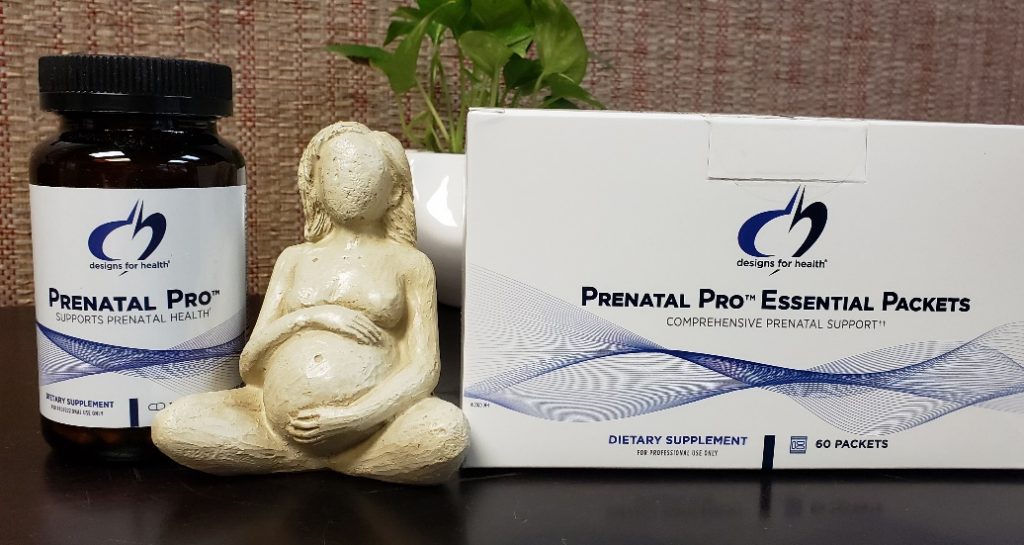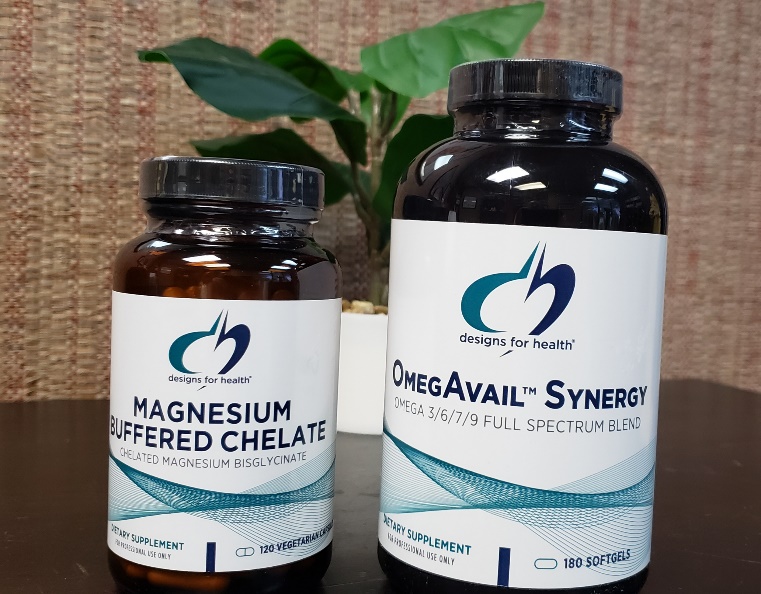
The forty or so weeks of pregnancy are a special time of tremendous nutritional needs. This is especially important the more babies you have carried and breastfed. Keeping a healthy lifestyle throughout your whole childbearing years is key for both baby and mother. Important steps to a healthy pregnancy include eating a balanced diet; gaining the right amount of weight; enjoying regular physical activity; taking nutritional supplements if recommended by your midwife; and avoiding alcohol, tobacco and other harmful substances.
TO ORDER REFILL DESIGNS FOR HEALTH SUPPLEMENTS, AS CARRIED IN THE BIRTH CENTER, order here: BIOBIRTH.ehealth.com
Receive 10% discount with the code: FIRST10SAVE
Folate NOT Folic Acid— Prevent brain and spinal cord birth problems
· Folate is a natural source of Vitamin B9 that helps prevent serious neurological problems with the developing brain and spinal cord (neural tube defects). The synthetic form of folate found in many supplements and fortified foods is known as folic acid. Folate supplementation has been shown to decrease the risk of premature birth and having a low birth weight baby.
· How much you need: 400 micrograms (mcg) a day of folate before conception and 600 to 1,000 micrograms of folate a day throughout pregnancy
· Good sources: Fortified cereals are great sources of folic acid. Dark green, leafy vegetables, citrus fruits, and dried beans, peas and lentils are good sources of naturally occurring folate.
· ALL supplements offered here at BioBirth do NOT contain synthetic folic acid but natural folate.
| Food | Serving size | Folate or folic acid content |
|---|---|---|
| Cereal | 3/4 cup (15 to 60 g) ready-to-eat cereal | 100 to 700 mcg — choose a cereal that’s 50% to 100% fortified |
| Spinach | 1/2 cup (95 g) boiled spinach | 131 mcg |
| Beans | 1/2 cup (89 g) boiled Great Northern beans | 90 mcg |
| Asparagus | 4 boiled spears (60 g) | 89 mcg |
| Oranges | 1 small orange (96 g) | 29 mcg |
| Peanuts | 1 ounce (28 g) dry roasted | 27 mcg |
Food Data Central. U.S. Department of Agriculture, Agricultural Research Service. https://fdc.nal.usda.gov. Accessed Jan. 27, 2022

· In addition to making healthy food choices, taking a daily prenatal vitamin — ideally starting at least three months before conception — can help ensure you’re getting enough of this essential nutrient. Anyone who might become pregnant should take a daily vitamin supplement containing folic acid.
· Calcium — Strengthen bones and muscles
· You and your baby need calcium for strong bones and teeth. Calcium also supports healthy functioning of the circulatory, muscular and nervous systems.
· How much you need: 1,000 milligrams (mg) a day; pregnant mothers need 1,300 milligrams a day
· Good sources: Dairy products are good absorbable sources of calcium. Nondairy sources include broccoli and kale. Many fruit juices and breakfast cereals are fortified with calcium, too.
| Food | Serving size | Calcium content |
| Cereal | 1 cup (20 to 60 g) calcium-fortified ready-to-eat cereal | 100 to 1,000 mg |
| Juice | 1 cup (237 mL) calcium-fortified orange juice | 349 mg |
| Cheese | 1.5 oz. (43 g) part-skim mozzarella | 333 mg |
| Milk | 1 cup (237 mL) skim milk | 299 mg |
| Yogurt | 6 oz. (170 g) low-fat fruit yogurt with low-calorie sweetener | 258 mg |
| Salmon | 3 oz. (85 g) canned pink salmon with bones | 181 mg |
| Spinach | 1/2 cup (95 g) boiled spinach | 123 mg |
Food Data Central. U.S. Department of Agriculture, Agricultural Research Service. https://fdc.nal.usda.gov. Accessed Jan. 27, 2022

· Vitamin D — Promote bone strength
· Vitamin D works with calcium to help build your baby’s bones and teeth.
· How much you need: 600 international units (IU) a day
· Good sources: Fatty fish, such as salmon, is a great source of vitamin D. Other options include fortified milk and orange juice.
· Vitamin D is best absorbed with Vitamin K
| Food | Serving size | Vitamin D content |
| Fish | 3 oz. (85 g) cooked sockeye salmon | 570 IU |
| Milk | 1 cup (237 mL) skim milk with added vitamin D | 115 IU |
| Juice | 8 oz. (237 mL) calcium- and vitamin D-fortified orange juice | 100 IU |
| Eggs | 1 large hard-boiled egg (50 g) | 44 IU |
Food Data Central. U.S. Department of Agriculture, Agricultural Research Service. https://fdc.nal.usda.gov. Accessed Jan. 27, 2022
· Protein — Promote growth
· Protein is crucial for your baby’s growth throughout pregnancy.
· How much you need: 70-80 grams (g) a day
· Good sources: Lean meat, poultry, seafood and eggs are great sources of protein. Other options include beans and peas, nuts, seeds, and soy products.
| Food | Serving size | Protein content |
| Cottage cheese | 1 cup (226 g) low-fat, 1% milk cottage cheese | 28 g |
| Poultry | 3 oz. (86 g) boneless, skinless grilled chicken breast | 26 g |
| Fish | 3 oz. (85 g) canned pink salmon with bones | 17 g |
| Lentils | 1/2 cup (99 g) boiled lentils | 9 g |
| Milk | 1 cup (237 mL) skim milk | 8 g |
| Peanut butter | 2 T (32 g) peanut butter | 7 g |
| Eggs | 1 large hard-boiled egg (50 g) | 6 g |
Food Data Central. U.S. Department of Agriculture, Agricultural Research Service. https://fdc.nal.usda.gov. Accessed Jan. 27, 2022
· Iron — Prevent iron deficiency anemia
· The body uses iron to make hemoglobin. Hemoglobin is a protein in the red blood cells that carries oxygen to the body’s tissues. During pregnancy, you need double the amount of iron that non-pregnant women need. Your body needs this iron to make more blood to supply oxygen to your baby.
· If you don’t have enough iron stores or get enough iron during pregnancy, you could develop iron deficiency anemia. You might develop headaches or become fatigued. Severe iron deficiency anemia during pregnancy also increases the risk of premature birth, having a low birth weight baby and postpartum depression.
· How much you need: 27 milligrams a day
· Good sources: Lean red meat, poultry and fish are good sources of iron. Other options include iron-fortified breakfast cereals, beans and vegetables.
| Food | Serving size | Iron content |
| Cereal | 1/2 cup (40 g) quick oats fortified with iron | 20 mg |
| Meat | 3 oz. (85 g) roasted lean beef tenderloin | 3 mg |
| Spinach | 1/2 cup (90 g) boiled spinach | 3 mg |
| Beans | 1/2 cup (88.5 g) boiled kidney beans | 2 mg |
| Poultry | 3 oz. (85 g) roasted dark turkey | 1 mg |
Source: USDA National Nutrient Database for Standard Reference, Release 28
· Prenatal vitamins typically contain iron. In some cases, your midwife might recommend a separate iron supplement.

· The iron from animal products, such as meat, is most easily absorbed. To enhance the absorption of iron from plant sources and supplements, pair them with a food or drink high in vitamin C — such as orange juice, tomato juice or strawberries. If you take iron supplements with orange juice, avoid the calcium-fortified variety. Although calcium is an essential nutrient during pregnancy, it can decrease iron absorption. So taking your iron supplements in the morning and calcium/magnesium supplements at night can help with this.
Follow these general food safety guidelines when handling and cooking food:
· Wash. Rinse all raw produce thoroughly under running tap water before eating, cutting or cooking.
· Clean. Wash your hands, knives, countertops and cutting boards after handling and preparing uncooked foods.
· Cook. Cook beef, pork or poultry to a safe internal temperature verified by a food thermometer.
· Chill. Promptly refrigerate all perishable food.
Avoid eating the following foods during pregnancy:
· Sugars and excessive carbs
· Hot dogs and luncheon meats (unless they are heated until steaming hot before serving)
· Raw and undercooked seafood, eggs and meat. Do not eat sushi made with raw fish (cooked sushi is safe).
· Refrigerated pâté and meat spreads
· Refrigerated smoked seafood
